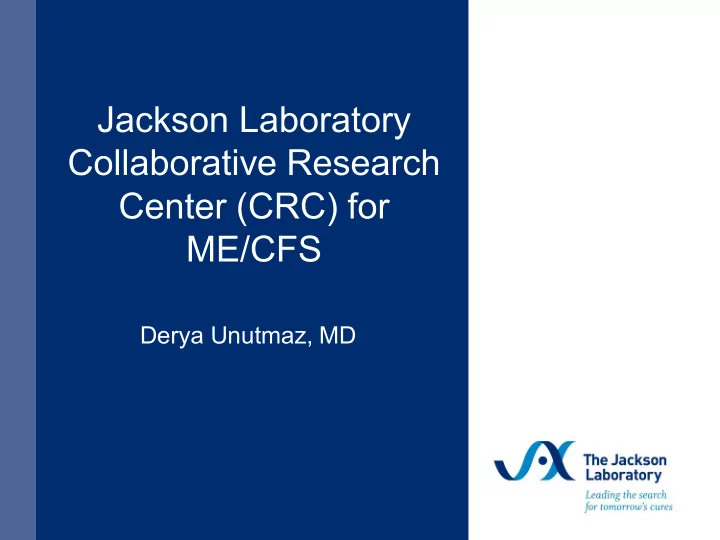

Jackson Laboratory Collaborative Research Center (CRC) for ME/CFS Derya Unutmaz, MD
Myalgic Encephalomyelitis/Chronic Fatigue Syndrome (ME/CFS)
��� Immune � � � Profiling Profiling Microbiome Metabolomics �� Clinical Samples � ��� � � ��� �� � � � Computational lnteractome
Why maintaining a balanced immune response is critically important for our health? The Bad The Good The Ugly Autoimmunity Chronic inflammation Allergies Chronic Illness Septic shock Clearance of infections Repair tissue damage
Inappropriate immune response has terrible health cost Cancer Diabetes Alzheimer’s Cardiovascular disease Diseases IMMUNE RESPONSE Allergic Autoimmune INFLAMMATION Diseases Diseases ME/CFS?
Microbiome shapes the immune system Microbes within us Credit: Joana Ricou / Steven H. Lee / Studio Graphiko, Nature, 2012
Maintaining microbial equilibrium is critical for healthy immunity Regulatory Commensal Inflammatory Bacteria Bacteria Bacteria Round et al. Nature Reviews Immunology (May 2009)
Disequilibrium of microbial ecosystem causes inflammation Dysbiosis Round et al. Nature Reviews Immunology (May 2009)
Diseases associated with disrupted microbiome - ME/CFS?
JAX ME/CFS CRC Research Projects 10
Division of Labor in the Immune System
Functional subsets of human T cells Naïve T cell Effector/Memory T cell THYMUS Immune regulation/suppression Treg T reg Help B cells (Autoimmunity) TfH Bacteria, viruses - IFN g (Autoimmunity) Th1 Parasites - IL-4, IL-5 (Allergy, asthma) CD4 Th2 Bacteria, Fungi - IL-17, IL-22 Th17 (Autoimmunity, inflammation) Viruses, tumors – (Cytotoxic) CTL Intracellular bacteria, microbiome – CD8 MAIT IL-17 (Cytotoxic) iNKT Bacteria, viruses, tumors? (cytotoxic) gd T Bacteria, tumors? (Cytotoxic)
Performing immune profiling using Flow Cytometry
How do we analyze the immune cell frequencies and function in human blood?
Microbiome is also personalized to each person
Microbiome Sequencing and Culturomics
Metabolome: control system of biological program Reprogram the immune response
Computational approaches to integrate patient’s clinical phenotype with biological data Subhierarchy Examples Fatigue Severity, triggering factors, duration Ability /response to exertion Post-exertional malaise. Sleep Quantity, quality, rhythm Pain Location, migration, intensity, duration Neurological/cognitive Cognition, concentration. Perceptual and motor disturbances, nervousness Autonomic manifestations Results of autonomic function tests, R-R variability, reduced vagal modulation Neuroendocrine Cortisol, growth hormone concentration, response to manifestations endocrine testing Immune anomalies Distribution of immune cells and their functionality History of infection Infectious disease ontology Environmental Sensitivity to food, medication, odors, temperature. Other medical history Other diseases Metabolomics, microbiota Microbiome in given patient and their metabolism Goal is to identify clinical and biomarkers that predict subgroups by dataset integration and machine-learning approaches.
“It is far more important to know which person has the disease than what disease the person has” ~ Hippocrates Credit: The Grace Gawler Institute
Community Outreach efforts • Organizing advocacy/patient group visits – example, MA CFIDS • Developed JAX CRC blog to chronicle both news/advances at Jax and ME/CFS in general: https://jaxmecfs.com • Frequent communication with patient and advocacy groups through social media and emails: ◦ Active following / interaction on twitter @Derya_ ◦ Courtney Gunter, program manager @courtneylgunter ◦ Separate community outreach program at Bateman Horne Center in Utah (Stephanie Griffin, @BatemanHorne ) • A Community Steering Committee meeting formed of patients/advocates/physicians is planned later this year.
Administrative Core Team Program Director: Derya Unutmaz, M.D. (Jax) – Human Immunology Associate Program Director: Julia Oh, Ph.D. (Jax) – Microbiome Program manager: Courtney Gunter, M.S. (Jax) – Data management and center project coordination and community outreach Email: Courtney.Gunter@jax.org,
Clinical Core and Community Outreach Team Cindy Bateman, M.D. (Bateman Horne Center) – ME/CFS clinician, lead clinical team. Suzanne Vernon, Ph.D . (Bateman Horne Center) – Clinical Core Co-Lead and community manager Mary Dimmock , (Connecticut) , patient advocate Morris Papernik, M.D. (Connecticut) Physician, ProHealth Carol Isaacson Barash, Patient Advocate Patrick Venetucci, Patient Advocate Beth Mazur, Co-Founder, MEAction
Immune/Microbiome Profiling Project Team Peter Robinson, M.D., M.S. (Jax) – Computational biology and Clinical Ontology Julia Oh, Ph.D. (Jax) – Microbiome Mark Adams, Ph.D . (Jax) – Microbial Genomics Derya Unutmaz, M.D . (Jax) – Immune profiling Dorothy Wheatcraft, Ph.D . (Jax) – metabolomics Alison Motsinger-Reif, Ph.D. (NCSU) – Bioinformatics and Biostatistics
Research Project Team Julia Oh, Ph.D . (Jax) – Microbiota culturomics Xudong Yao, Ph.D. (UCONN) – Proteomic Chemistry, bacteria metabolite identification Derya Unutmaz , M.D. (Jax) – Human Immunology assays Paul Robson, Ph.D . (Jax) – RNA-seq and Single Cell Biology Duygu Ucar, Ph.D. (Jax) – Bioinformatics of transcriptomes, epigenetics
QUESTIONS ?
Recommend
More recommend